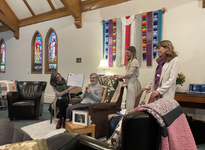How about this...
First Assisted Suicide Performed Inside an Evangelical Church in the USA
At around noon on March 9, Betty Sanguin arrived at her church,
Churchill Park United in Winnipeg, on a stretcher.
“The moment we rolled her in … and sat her up in her recliner, she lit up like a Christmas tree,” Lynda Sanguin-Colpitts, one of Sanguin’s daughters, recalls. “I hadn’t seen that much life in her eyes, so much joy [in a long time]. And honestly I think part of it was just being in the church.”
But this was no ordinary church service. Sanguin chose to die in the sanctuary that day.
Last spring, Sanguin was diagnosed with
amyotrophic lateral sclerosis (ALS). And when she decided to access medical assistance in dying (MAiD), she wanted the procedure to happen at her church.
Churchill Park United’s leadership team unanimously approved her request, and on March 9, the “crossing-over” ceremony took place in the church’s sanctuary. This was the first MAiD procedure to take place in a church in Manitoba.
Sanguin could no longer talk, so she used a whiteboard to communicate. When she was settled in her recliner, she wrote: “Welcome to my special day. I love you all so much.”
Sanguin’s children had worked hard to make the big space feel intimate. In the end, it was almost as if they were in her living room. There was a recliner for Sanguin to sit in, an area rug, a lamp, and a collection of family photos. Many of the quilts that Sanguin had made over the years were on display.
The chairs were set up in what Renée Sanguin, another one of her daughters, described as a “circle of care.” The six chairs immediately surrounding Betty were for her six children; the next tier was for husbands, wives and grandchildren; and the final tier was for friends.
During the ceremony, two of Sanguin’s grandchildren sang
“Let Your Light Shine on Me” and everyone joined in for “How Great Thou Art.” Sanguin waved her arms along to the music. Sanguin had prepared a playlist for the event, which was mostly gospel music — a lifelong love of hers.
“There was an opportunity for every single person who wanted to to come and hold her hand and tell her they loved her and say goodbye,” says Renée. “It was very touching and very intimate.”
Afterwards, the minister of Churchill Park United, Rev. Dawn Rolke, offered a blessing. Each of Betty’s six children placed their hands on her as Rolke invited Sanguin to go in peace.
Eventually, everyone was asked to leave the sanctuary and Sanguin met with the MAiD team. After giving her final consent, the procedure took place. Sanguin’s six children returned to the sanctuary and stayed with her until the end.
“That part was harder,” said Sanguin-Colpitts. “We just stood around her and we cried, we laughed, we did everything.”
She and Renée describe their mom as a courageous, smart, and outspoken woman who felt called to serve others. She was very involved at
Oak Table, which serves meals and provides hospitality for folks struggling in Winnipeg.
She was constantly asking questions and looking for answers — especially in her faith. Rolke recalled that during after-worship discussions, Sanguin asked the hard questions.
The decision to end her life was not an easy one for Sanguin. “She grappled with her faith … How do we know when our soul is ready? Will [her] soul be ready to cross over?” Renée says.
While much of the response to the crossing-over ceremony has been positive, there have been exceptions. Rolke has received messages telling her that Churchill Park United should close their doors and that they should be ashamed of their actions.

